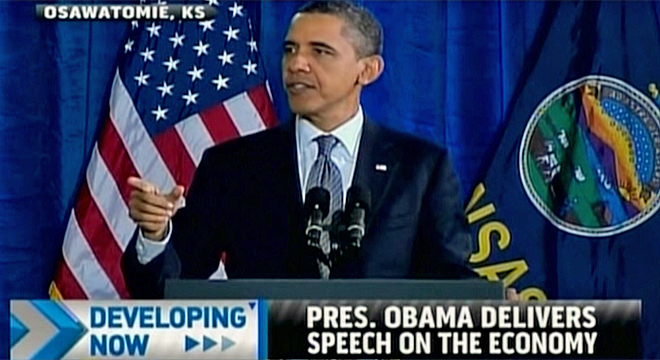President Obama offered one of his most detailed critiques yet of the GOP’s bedrock philosophy, likening them to a long line of discredited political movements who opposed taxes on the wealthy and regulations on business.
“I believe that this country succeeds when everyone gets a fair shot, when everyone does their fair share, and when everyone plays by the same rules,” Obama told a crowd at a high school in Osawatomie, Kansas. “Those aren’t Democratic or Republican values; 1% values or 99% values. They’re American values, and we have to reclaim them.”
Obama called the fight over the economy “the defining issue of our time.”
“This is a make or break moment for the middle class, and all those who are fighting to get into the middle class,” he said. “At stake is whether this will be a country where working people can earn enough to raise a family, build a modest savings, own a home, and secure their retirement.”
Taking a sweeping historical view that’s characterized some of his most famous speeches, particularly his 2008 address on race, Obama compared Republicans to Gilded Age elites and their attacks on Teddy Roosevelt’s reforms, who “thought massive inequality and exploitation was just the price of progress.”
“[Roosevelt] believed then what we know is true today: that the free market is the greatest force for economic progress in human history,” Obama said in his prepared remarks. “It’s led to a prosperity and standard of living unmatched by the rest of the world. But Roosevelt also knew that the free market has never been a free license to take whatever you want from whoever you can. It only works when there are rules of the road to ensure that competition is fair, open, and honest. ”
Obama noted that Roosevelt’s philosophy, who potential general election opponent Newt Gingrich said was a model for his own in an interview the same day, were hardly uncontroversial at the time.
“For this, Roosevelt was called a radical, a socialist, even a communist,” Obama said. “But today, we are a richer nation and a stronger democracy because of what he fought for in his last campaign: an eight hour work day and a minimum wage for women; insurance for the unemployed, the elderly, and those with disabilities; political reform and a progressive income tax. ”
Obama pivoted to attack the current Republican party as the latest incarnation of this longstanding laissez-faire strain, saying that their philosophy had been proven unworkable over and over since Roosevelt’s time.
“It’s a simple theory – one that speaks to our rugged individualism and healthy skepticism of too much government,” he said. “It fits well on a bumper sticker. Here’s the problem: It doesn’t work. It’s never worked. It didn’t work when it was tried in the decade before the Great Depression. It’s not what led to the incredible post-war boom of the 50s and 60s. And it didn’t work when we tried it during the last decade.”
Obama called on Congress to extend a payroll tax cut to help middle class families weather the weak economy and insisted that taxes on the wealthy are necessary for America to afford investments in future growth and safety net protections for the most vulnerable.
“We have to ask ourselves: do we want to make the investments we need in things like education, and research, and high-tech manufacturing?” he said. “Or do we want to keep in place the tax breaks for the wealthiest Americans in our country? Because we can’t afford to do both. That’s not politics. That’s just math.”
Obama has taken a lot of heat from the left over the years for failing to articulate an aggressive message against Republicans that directly targets their overarching small government message. Tuesday’s speech, however, went straight at Republicans core philosophy, moving Obama’s rhetoric much closer to their goal right as his re-election campaign heats up.









